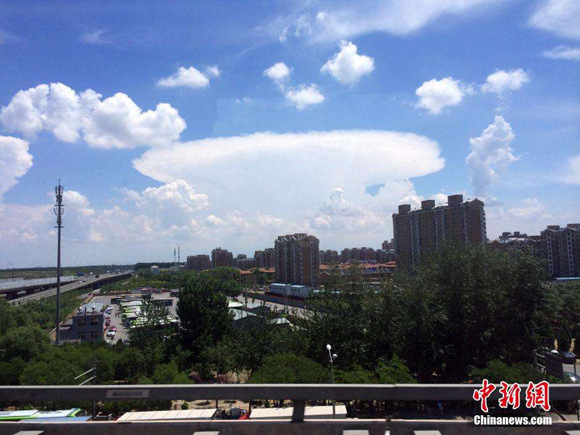
(File Photo/China News Service)
The Ministry of Environmental Protection will spare no efforts as it works on a three-year plan to ensure greater air pollution control because the country's environmental protection still lags behind economic development, a senior official said.
Zhao Yingmin, vice-minister of environmental protection, discussed the issue while responding to concerns from the State Council, China's Cabinet, at its regular meeting on Thursday morning.
"In the past 5 years, China has made enormous progress in the battle against air pollution, and the ability to monitor air quality has greatly improved," he said.
The meeting was held by the Counselors' Office of the State Council for briefings on recent important policies for leading officials of the State Council whose expertise is related to the matter.
Yet Zhao pointed out that the problems still exist in pollution prevention, including the imbalance in regional development in air quality and a reluctance to change the energy structure.
Official statements released after the Central Economic Work Conference on Dec 20 announced that the "three tough battles" in the next three years will be preventing major financial risks, targeting poverty alleviation and pollution.
Zhao said progress in environmental protection lags behind economic development. "Coal use still accounts for more than 60 percent of China's energy consumption," he said.
Last year was the deadline for China's Action Plan for Air Pollution Control, which was launched in 2013.
Figures released by the ministry show that the average density of PM2.5 in the 338 cities nationwide monitored by the ministry stood at 43 micrograms per cubic meter in 2017, down by 6.5 percent year-on-year.
The density of PM2.5 in Beijing was 58 mcg/cu m in 2017, down by 20.5 percent year-on-year, meeting the goal of reducing PM2.5 levels to around 60 mcg/cu m, Zhao said.
China has been intensifying its efforts to fight pollution and environmental degradation after decades that left the country saddled with problems over the past five years, such as smog and contaminated soil, Zhao said.
In response to State Council concerns over the shortages of natural gas amid China's efforts to replace coal-fired boilers with natural gas-and electricity-powered ones in the smog-plagued northern region, Zhao said one reason is that more natural gas is being consumed by industry.
He said China still relies heavily on natural gas imports.
In 2017, the amount of electricity generated by natural gas in China increased by 23 percent, which is also part of the reason natural gas ran short, he said.
Zhao, who participated in field research to determine the reason for the recent natural gas shortage in the Beijing-Tianjin-Hebei region this winter, suggested that individuals and households should have higher priority in the use of newly generated natural gas than industries in the future. He said this is because coal, when burned by individuals or households, creates more air pollution than coal burned by industry.


















































